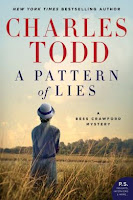Next time I may write about some of the best books I read this year, but today I want to focus on other superlatives, some of those suggested by J. Peder Zane in his book Remarkable Reads.
Most Enchanting Book: That would have to be Undermajordomo Minor by Patrick DeWitt. Here's a witty, moving novel that reads like a fairy tale, something akin to The Princess Bride. There's a giant, a castle, true love and a Very Large Hole.
 |
| A still from the film version of Fahrenheit 451 |
Most Important Book: Ray Bradbury's
Fahrenheit 451, published in 1951, seems as important as ever. In Bradbury's vision, firemen don't put out fires but start them, especially for the purpose of burning books. In 2021 in America, there were hints that his vision might actually be coming true, with even Dr. Seuss books being stripped from shelves for being politically incorrect.
Most Daunting Book: Edward Dolnick's Down the Great Unknown is daunting only in the sense that to read it is to accompany John Wesley Powell, at least in one's mind, on the first boat ride down the Colorado River through the Grand Canyon. It's interesting to consider that the only members of his team to die were those who abandoned the expedition because it was too dangerous.
Wisest Book: This title goes to Malcolm Gladwell's David and Goliath. Gladwell makes the case that the weak sometimes have the advantage over the strong because their weakness forces them to look for unconventional ways to win.
Most Familiar Book: I read Saul Bellow's Henderson the Rain King for the third time this year, so by now it is a very familiar book. It's the story of a wealthy man who knows something is missing from his life, and he goes to central Africa to try to discover what it is.
Most Incomprehensible Book: Sam Taylor's The Amnesiac turned out to be too surrealistic for my taste. There's a chunk of his life that James Purdue cannot remember, and the novel is about his search to discover the missing pieces. S.J. Watson explores a similar plot in Before I Go to Sleep but with greater success.
Most Beautiful Book: I purchased a copy of William Trevor's short story collection A Bit on the Side when I visited England in 2005, but didn't read it until early this year. I was amazed by the beauty and tenderness of these stories.
Most Fearless Book: Because of its subject matter, Lolita was a fearless book when it was published in 1958, and a new collection of essays about the novel, Lolita in the Afterlife, seems no less fearless.
Most Surprising Book: I expected Larry Watson's short novel Montana 1948 to be a good book. What I didn't expect was a great book.
Most Disappointing Book: The Fine Art of Literary Mayhem has been around for a number of years, so I thought this collection of stories about literary feuds and arguments would be more entertaining than it turned out to be.
Most Unpleasant Book: Usually I discard unpleasant books long before I finish reading them, so I have to interpret unpleasant in a different way. My choice is The Terrible Hours by Peter Maas, which is about the crew of an American submarine stranded at the bottom of the sea. Sounds terribly unpleasant to me.
Most Luminous Book: My vote here goes to Matt Haig's incredible novel The Humans, which is about a monstrous being from another planet who takes the form of a human in order to destroy all traces of a dangerous mathematical formula. This requires him to learn to be a human, and in so doing he becomes a better human than the man he replaced. This was a contender for the wisest book of the year.













